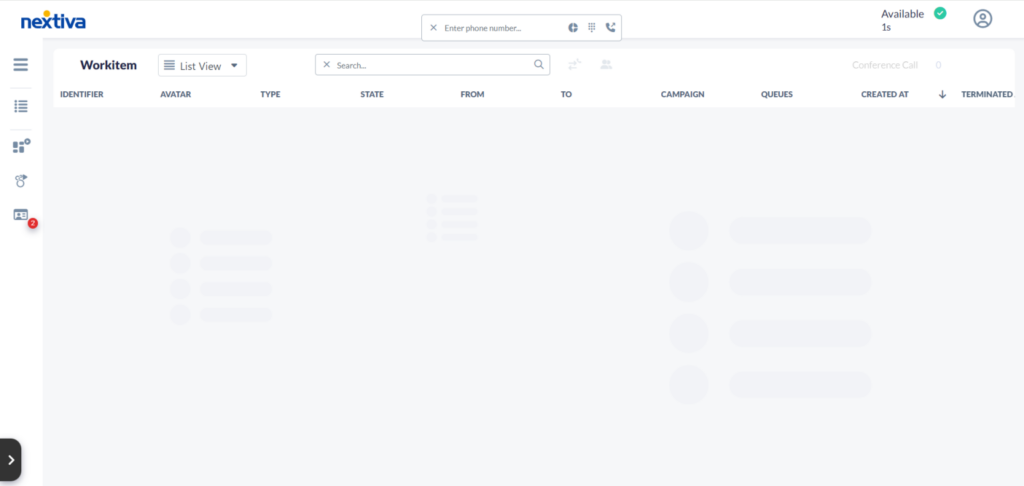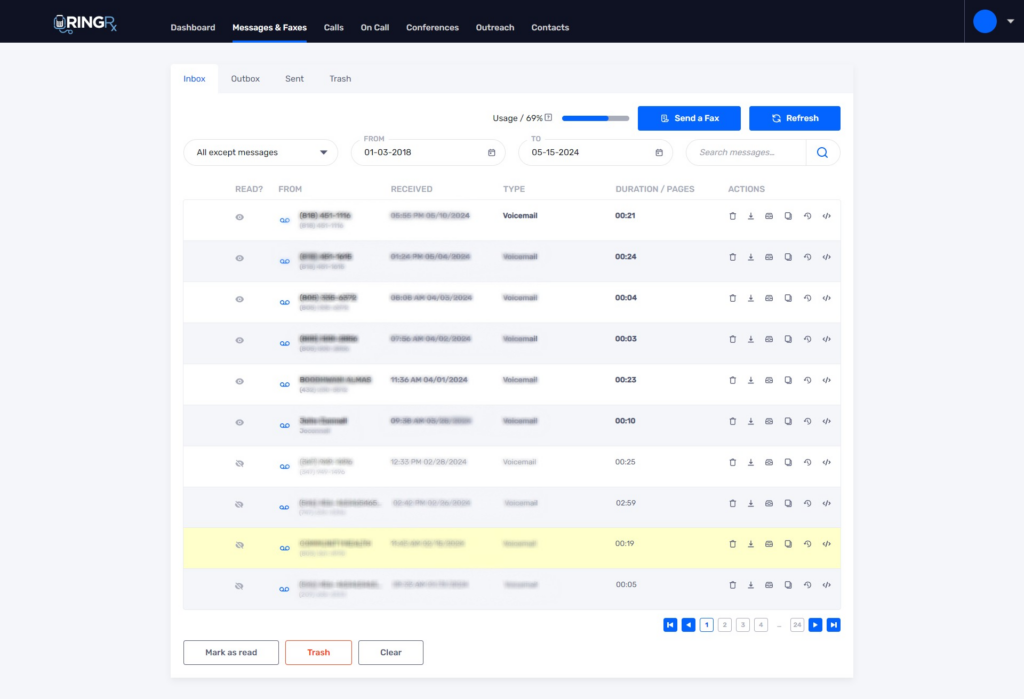8 Best HIPAA-compliant Telehealth Platforms In 2025

Healthcare faces a critical challenge. While virtual care transforms patient services, data security threats loom large. Healthcare accounts for 79% of all reported data breaches across industries, and nearly 80% of these breaches stem from hacking or IT incidents.*
Healthcare facilities investing in telehealth stand to capture their share of a $459.8 billion market opportunity by 2030. Already, 75% of U.S. hospitals leverage telehealth to reduce operational costs, expand patient reach, and increase revenue streams. Those without secure telehealth capabilities risk falling behind competitors and losing patients to more accessible providers.
This growth demands robust security. With 67% of healthcare breaches exposing medical information through unencrypted devices or poor access controls, choosing the right HIPAA-compliant platform matters more than ever.
Key takeaways:
- Healthcare data breaches affect 79% of the industry. HIPAA-compliant platforms with encryption, access controls, and audit trails protect patient information and provider reputation.
- Clear, reliable communication directly affects patient care quality. Choose platforms offering HD voice quality, minimal dropouts, and consistent performance across locations.
- Healthcare providers need unified workflows. Platforms that integrate with existing systems, from CRMs to scheduling software, reduce administrative burden and improve staff productivity.
What Is a HIPAA-Compliant Telehealth Platform?
Healthcare providers need secure communication systems to protect patient data. HIPAA-compliant telehealth platforms provide encrypted channels for patient-provider interactions while safeguarding protected health information (PHI).
These platforms must meet specific technical requirements. End-to-end encryption, secure data storage, and role-based access controls form the foundation. Administrative safeguards include audit trails, documentation procedures, and regular security assessments. Physical security measures protect servers and devices storing patient data.
Risk management drives compliance strategy. Healthcare organizations face penalties of up to $50,000 per violation for HIPAA breaches. Proper platform selection helps prevent costly mistakes. Beyond penalties, data breaches damage patient trust and provider reputation.
Compliant platforms require Business Associate Agreements (BAAs). These contracts establish security responsibilities between providers and technology vendors. Key technical standards include:
- 256-bit encryption for data transmission
- Secure access authentication
- PHI storage protection
- Comprehensive activity logging
- Regular security updates
Operational benefits extend beyond compliance. Secure platforms streamline workflows and improve efficiency. Features like automated workflows and access controls help staff maintain security while focusing on patient care.
Experience enterprise-grade call quality and HIPAA compliance with CloudTalk’s free trial. No credit card required.
8 best HIPAA-compliant telehealth platforms
Healthcare providers face increasing pressure to deliver efficient, secure patient communication. From medical practices handling appointment scheduling to mental health providers conducting phone consultations, choosing the right platform impacts daily operations. These solutions maintain HIPAA compliance while offering specialized features for healthcare communication.
1. CloudTalk

CloudTalk provides secure patient communication with powerful dialing capabilities. The platform excels in call quality and compliance features for healthcare providers.
Best For:
- High-volume patient communication
- Multi-location healthcare practices
- International medical operations
Key Features:
- Intelligent dialing systems
- Advanced call analytics
- International number coverage
- Custom security rules
- HIPAA-compliant call recording
Integrations:
- Healthcare CRM systems
- Scheduling software
- Practice management tools
Standout Capabilities:
- Power dialer for outreach
- Real-time monitoring
- Automated call routing
- Crystal-clear voice quality
- Comprehensive audit trails
Pricing:
- Lite: 19$
- Starter: 34$
- Essential: 39$
- Expert: 69$
Master call center monitoring with these best practices.
2. CallHippo

CallHippo offers a VoIP phone system with healthcare-specific features and compliance measures.
Best For:
- Small to medium medical practices
- Remote healthcare teams
- Patient scheduling operations
Key Features:
- Smart call forwarding
- Call masking
- Virtual phone numbers
- Call recording
- Basic analytics
Integrations:
- Limited CRM options
- Basic helpdesk tools
- Calendar applications
Standout Capabilities:
- Smart call distribution
- Call whispering feature
- Basic power dialing
- Browser-based system
Pricing:
- Basic: $0 per user/month
- Bronze: $16 per user/month
- Silver: $24 per user/month
- Platinum: $40 per user/month
3. Nextiva

Nextiva combines VoIP capabilities with unified communications features for healthcare providers.
Best For:
- Large medical facilities
- Healthcare call centers
- Multi-department practices
Key Features:
- Voice analytics
- Team collaboration tools
- Mobile application
- Security protocols
- Call encryption
Integrations:
- Major CRM platforms
- Healthcare software
- Business tools
Standout Capabilities:
- HD voice quality
- Advanced analytics
- Team messaging
- Auto-attendant features
Pricing:
- Digital: $20 per user/month
- Core: $30 per user/month
- Engage: $40 per user/month
- Power Suite: $60 per user/month
- Enterprise Essential: $129 per agent/month
- Enterprise Professional: $159 per agent/month
- Enterprise Premium: $199 per agent/month
4. Dialpad

Dialpad delivers AI-powered communication capabilities with HIPAA compliance built-in.
Best For:
- Technology-forward practices
- Voice analytics needs
- Patient support teams
Key Features:
- AI voice assistant
- Sentiment analysis
- Voice transcription
- Call routing
- Mobile support
Integrations:
- Enterprise CRM systems
- Google Workspace
- Microsoft 365
Standout Capabilities:
- Real-time coaching
- Voice intelligence
- Post-call summaries
- Basic power dialing
Pricing:
- Standard: $15 user/month
- Pro: $25 per user/month
- Enterprise: Quote-based
5. RingRx

RingRx focuses specifically on healthcare communications with dedicated compliance features.
Best For:
- Small medical practices
- Healthcare specialists
- Individual providers
Key Features:
- On-call scheduling
- Secure messaging
- Call forwarding
- Voicemail-to-text
- HIPAA fax
Integrations:
- Limited healthcare systems
- Basic CRM options
- EHR compatibility
Standout Capabilities:
- Medical answering service
- Nurse triage system
- Patient messaging
- Basic call routing
Pricing:
- Lite: $15 per user/month
- Grow: $19 per user/month
- Clinic: $25 per user/month
6. GoTo Connect

GoTo Connect provides cloud-based communication solutions with healthcare security features.
Best For:
- Budget-conscious practices
- Basic calling needs
- Simple deployments
Key Features:
- Standard VoIP functions
- Basic call recording
- Number porting
- Auto-attendant
- Call queuing
Integrations:
- Limited options
- Basic CRM tools
- Email systems
Standout Capabilities:
- Simple interface
- Cost-effective plans
- Easy setup
- Basic compliance
Pricing:
- Basic: $27 per user/month
- Standard: $32 per user/month
- Contact Center Add-On: Quote-based pricing tiers
- Customer Engagement Add-On: Custom pricing
7. JustCall
JustCall combines contact center capabilities with HIPAA-compliant communication features.
Best For:
- Patient outreach teams
- Medical appointment booking
- Healthcare sales teams
Key Features:
- SMS campaigns
- Call recording
- Basic power dialer
- Number management
- Call tracking
Integrations:
- Popular CRM platforms
- Help desk software
- Business tools
Standout Capabilities:
- SMS automation
- Campaign management
- Call monitoring
- Basic analytics
Pricing:
- Essentials: $19 per user/month
- Team: $29 per user/month
- Pro: $49 per user/month
- Business: Quote-based
8. 3CX

3CX offers on-premise and cloud solutions with healthcare security standards.
Best For:
- Traditional medical offices
- IT-managed practices
- Local healthcare providers
Key Features:
- Self-hosted option
- Live chat
- Call queuing
- IVR system
- Conference calls
Integrations:
- Microsoft systems
- Basic CRM options
- Office tools
Standout Capabilities:
- Own server hosting
- Cost flexibility
- Traditional PBX features
- Basic compliance
Pricing:
- Pro: Starts at $350 /month
- Enterprise Starts at $450 /month
Compare the best HIPAA-compliant VoIP solutions
Key Features of HIPAA-Compliant Telehealth Platforms
The phone rings at Memorial Health’s front desk, a fictional healthcare facility. A nurse practitioner reaches for her headset while simultaneously pulling up a patient file. Down the hall, a billing specialist discusses payment plans over a secure line.
In the adjacent building, the mental health department conducts remote consultations. Each conversation contains protected health information. Each interaction demands absolute security.
Behind these everyday healthcare scenarios, robust technical safeguards power seamless, secure communication. Let’s examine the critical features that protect patient data while keeping healthcare operations running smoothly.
- Data Encryption: Healthcare providers handle sensitive patient information daily. Strong encryption secures this data during transmission and storage. Modern platforms use 256-bit encryption, the industry standard for healthcare communications. This prevents unauthorized access during patient consultations.
- Secure Communication: Encrypted calls protect confidential patient-provider discussions. Advanced phone systems ensure crystal-clear audio quality without compromising security. End-to-end encryption keeps conversations private. Call recording features maintain security while enabling quality monitoring.
- Access Control: Role-based permissions streamline workflow management. Administrators control exactly who can access patient data. Custom user roles match organizational structures. Time-based access restrictions add another security layer. This granular control prevents unauthorized data exposure.
- Audit Trails: Comprehensive logging tracks all system activities. Detailed reports show who accessed what information and when. This creates accountability and simplifies compliance monitoring. Regular audits help identify potential security risks early.
- Cloud Security: HIPAA-compliant cloud storage balances security with accessibility. Authorized users can access patient data securely from any location. Redundant storage prevents data loss. Regular backups maintain business continuity.
How To Choose the Right HIPAA-Compliant Telehealth Platform
A Philadelphia mental health practice struggles with dropped calls during patient consultations. A Miami urgent care center needs better call routing for its multilingual patient base. A growing Chicago medical group wants to expand without the hassle of physical phone lines in each new location.
Each healthcare provider faces unique communication challenges. Here’s what to evaluate when selecting a HIPAA-compliant platform:
Global Reach
Modern healthcare crosses borders. Leading platforms offer coverage in 160+ countries with local number availability. This provides patients with familiar area codes while ensuring consistent service quality worldwide. International teams can collaborate seamlessly across time zones.
VoIP Technology
Traditional phone systems limit healthcare growth. VoIP solutions eliminate physical infrastructure constraints. Remote staff can handle patient calls from anywhere. Practices scale operations without hardware investments. Built-in redundancy prevents service interruptions.
Integration Capabilities
Healthcare workflows demand connected systems. Look for platforms that integrate with existing tools. Seamless CRM integration maintains complete patient interaction records. Calendar synchronization streamlines appointment scheduling. Automated documentation saves staff time.
Security Architecture
HIPAA compliance requires comprehensive security. Evaluate encryption standards, access controls, and audit capabilities. Business Associate Agreements should clearly define vendor responsibilities. Regular security updates protect against emerging threats.
Call Quality
Patient communication demands crystal-clear audio. HD voice quality ensures accurate symptom discussion. Advanced routing prevents dropped calls. Network redundancy maintains connection stability. Call recording features enable quality monitoring while maintaining compliance.
Cost Structure
Evaluate total operational impact beyond monthly fees. Consider:
- Per-user pricing flexibility
- International calling rates
- Integration costs
- Training requirements
- Scalability expenses
Securing Your Healthcare Communication Future
Healthcare providers must balance expansion with security. The right HIPAA-compliant platform serves both needs.
Consider these factors when making your choice:
- Current communication volume and growth plans
- Required security features and compliance needs
- Integration requirements with existing systems
- Budget and ROI expectations
- Staff training and adoption needs
While each platform offers unique advantages, CloudTalk stands out for healthcare communication with enterprise-grade call quality, comprehensive security, and powerful dialing features.
Ready to Secure Your Patient Communications?
See HIPAA-Compliant Communications in Action
Source:
FAQs
Is Zoom HIPAA compliant for telehealth?
Standard Zoom accounts don’t meet HIPAA standards. Only Zoom for Healthcare offers compliance through BAAs, encryption, and role-based security controls. Healthcare providers must use this specialized version.
How much does a HIPAA-compliant phone system cost?
HIPAA-compliant phone systems range from $30-$100 per user monthly. Pricing depends on users, features, call volume, and integration needs. Enterprise solutions may cost more based on requirements.
Which telehealth platforms are HIPAA compliant?
HIPAA-compliant platforms include secure phone systems like CloudTalk, video platforms with healthcare versions, and specialized telehealth solutions. Each must provide security measures and sign a BAA.
What HIPAA-compliant platforms work for teledentistry?
Teledentistry requires platforms to handle secure communications, image sharing, and appointment scheduling. Voice systems like CloudTalk integrate with dental practice software for complete solutions.
What features make telehealth services HIPAA compliant?
Essential features include end-to-end encryption, access controls, audit trails, secure storage, and signed BAAs. Regular security updates and documentation features ensure ongoing compliance.




















